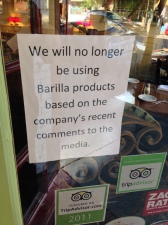This item first appeared on Bloomberg Businessweek’s “The Management Blog”, October 7, 2013. [http://www.businessweek.com/articles/2013-10-07/barilla-in-hot-water-offers-a-lesson-in-reputation-management] In the classic Simpsons episode “Lisa vs. Malibu Stacy,” Marge Simpson tells her daughter: “Lisa, ordinarily I’d say you should stand up for what you believe in. But you’ve been doing that an awful lot lately!”Pasta purveyor Guido Barilla must know the feeling. After the Barilla Group chairman said in an interview that he supported a “classic family” and would never feature “a homosexual family” in his company’s advertising, he quickly found himself in hot water. Word spread via social media in a matter of hours, and now Barilla faces international calls for a boycott even after his hasty apology. Twenty percent of Barilla’s Wikipedia page currently covers the controversy, and competitor Bertoli quickly responded with pro-gay pasta ads and social media.
This is not the first time that a company has faced a reputational crisis over gay rights issues. Target received boycott threats over its contribution to a political group that supported a candidate who opposed same-sex marriage. Fast food chain Chick-fil-A spurred a similar uproar in late July when President and COO Dan T. Cathy stated that Chick-fil-A supported “the biblical definition of the family unit.” While the deeply religious roots of Chick-fil-A’s founder and family owners were well known, the new comments quickly led to boycott threats by gay rights groups, statements by public officials in cities such as Boston or Chicago saying that the company was not welcome there, and the decision by the Jim Henson Company, creator of the Muppets, to no longer supply the company with toys.
In most cases, companies are well-advised to stay clear of polarizing issues. This can present challenges for multinational companies operating in multiple countries with diverse values. A comment that hardly raises eyebrows in a business’s home country may create outrage elsewhere.
Privately held companies such as Barilla may be particularly at risk if their governance structures are under-developed. Corporate boards can play a crucial role in insisting that management develops proper reputation management structures. And of course, if a CEO becomes the main problem, boards must be able to step in and replace a struggling CEO. This may pose a problem in family-owned business or publicly held companies that give founders or families effective control, such as News Corp during the 2011-12 hacking scandal.
That said, boycotts don’t always work. They require not only a controversial issue, but also sophisticated activist strategies. For example, boycotts are more effective if they target a single company rather than an industry to lower the costs of customer participation.
Sometimes a boycott over a polarizing issue can even pay off for a company. After the attack on Chick-fil-A by pro gay rights groups, conservative advocacy groups and politicians quickly defended the company. Conservatives asked supporters to increase their visits, effectively organizing a “buy-cott.” The effort had some (limited) sales impact on Chick-fil-A, raising the intriguing and somewhat worrisome specter of consumer preferences that significantly correlate with political ideologies. But before embracing another new marketing fad, companies should be careful with (unintentionally?) defining themselves as a “Republican” or “Democratic” brand. Otherwise, they will be in for some interesting times.
